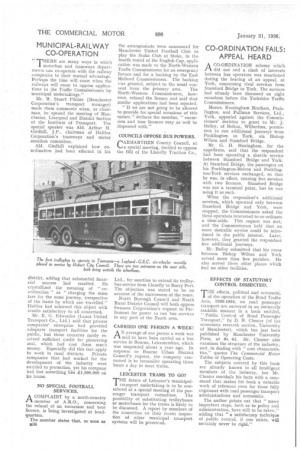MUNICIPAL-RAILWAY CO-OPERATION
Page 46

If you've noticed an error in this article please click here to report it so we can fix it.
" rr'HERE are many ways in which
1 motorbus and tramways departments can co-operate with the railway companies to their mutual advantage. Perhaps the time will come when the railways will cease to oppose applications to the Traffic Commissioners • by municipal undertakings."
Mr. R. Stuart Pikher (Manchester Corporation's transport manager) made these comments when, as chairman, he opened the meeting of Manchester, Liverpool and District Section of the Institute of Transport. The special speaker was Aid, Arthur H. J.P., chairman of Halifax Corporation's tramways and motor omnibus committee.
Aid. Gledhill explained how coordination had been effected in his district, adding that substantial financial success had resulted. He crystallized the meaning of " coordination " as " charging the same fare for the same journey, irrespective of the buses by which one travelled." Halifax had achieved this object with results satisfactory to all concerned.
Mr. E. G. Edwardes (Lanes United Transport Co., Ltd.) said that private companies' enterprise had provided adequate transport facilities for the 'public, but those concerns rarely received sufficient credit for pioneering zeal, which had cost them much money. Especially did this fact apply to work in rural districts. Private companies that had worked for the development of the industry were entitled to protection, yet his company had lost something like £1,000,000 on its trams.
NO SPECIAL FOOTBALL SERVICES,
ACOMPLAINT by a north-country member of A.R.O., concerning the refusal of an excursion and tour licence, is being investigated at headquarters.
The member states that, so soon as B36 the arrangements were announced for Manchester United Football Club to play the Stoke Club at Stoke, in the fourth round of the English Cup, application was made to the North-Western .Traffic Commissioners for an emergency licence and for a backing by the East Midland Commissioners. The backing was granted, subject to the usual con sent from the primary area. The North-Western Commissioners, however, refused the licence and said that similar applications had been rejected.
"If we are not going to be allowed to provide for special occasions of this nature," declares the member, " excursion and tour licences may as well be dispensed with."
COUNCILS OPPOSE BUS POWERS.
CARMARTHEN County Council, at a special meeting, decided to oppose the Bill of the Llanelly Traction Co.,
Ltd., for sanction to extend its trolleybus service from Llanelly to Burry Port. The objection was stated to be on account of the narrowness of the route.
Neath Borough Council and Neath Rural District Council will both oppose Swansea Corporation's request fa Parliament for power to run bus services in any part of the Neath area.
CARRIED ONE PERSON A WEEK!
AN average of one person a week was said to have been carried on a bus sea-vice in Bourne, Leicestershire, which was suspended about a year ago. In response to Bourne Urban District Council's request, the company concerned is to reconsider operating three buses a day to meet trains.
LEICESTER TRAMS TO GO?
THE future of Leicester's municipal1 transport undertaking is to be considered at a special meeting of the passenger transport committee. The possibility of substituting trolleybuses or motorbuses for the trams is likely to be discussed. A report by members of the committee on their recent inspection of other municipal transport systems will be presented.
CO-ORDINATION FAILS: APPEAL HEARD
A CO-ORDINATION scheme which 1-1 did not end a clash of interests between bus operators was mentioned during the hearing of an appeal, at York, concerning rival services from Stamford Bridge to York. The services had already been discussed on eight occasions before the Yorkshire Traffic Commissioners.
Messrs. Everingham Brothers, Pocklington, and Pullman Services, Ltd., York, appealed 'against the Commis-. sioners' decision to grant to Mr. J. Bailey, of Bolton, Wilberfoss, permission to run additional journeys from Pocklington, to York, via Bishop Wilton and Stamford Bridge.
Mr. G. H. Heningham, for the appellants, said that the respondent bad been operating a shuttle service between Stamford Bridge and York. At Stamford Bridge, the passengers on his Pocklington-Malton and Pocklington-York services exchanged, so that be was, in effect, running five services with two licences. Stamford Bridge was not a terminal point, but he was using it as such. When the respondent's additional services, which operated only between Stamford Bridge and York, were stopped, the Commissioners asked the three operators interested to co-ordinate a time-table. This request was met, and the Commissioners held that no more desirable service could be introduced in the public interest. Later, however, they granted the respondent Eve additional journeys.
Mr. Bailey submitted that his route between Bishop Wilton and York served more than five parishes. He also served three other places which had no other facilities.
EFFECTS OF STATUTORY CONTROL DISSECTED.
T.HE effects, political and economic', of the operation of the Road Traffic Acts, 1930-1934, on road passenger transport are surveyed in an eminently readable manner in a book entitled, " Public Control of Road .Passenger Transport," by D. N. Chester (of the economics research section, University of Manchester), which has just been published by Manchester University Press, at 8s. Ekl. Mr. Chester also examines the structure of the industry, and, in dealing with "cost characteristics," quotes The Commercial Motor Tables of Operating Costs.
The subjects covered by this book are already known to all intelligent members of the industry, but Mr. Chester marshals his facts with a command that makes his book a valuable work of reference even for those fully cognizant with road passenger transport administrations and economics.
The author points out that "many important steps, both as to policy and administration, have still to be taken," adding that "a satisfactory technique of public control, if one exists, will certainly never be rigid."




















































































